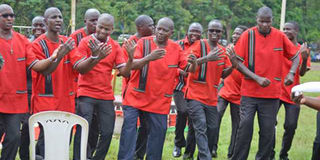Civil servants ordered to wear ‘Made in Kenya’ outfits on Fridays

Choir presents patriotic songs during the Madaraka Day celebrations at Jomo Kenyatta Sports Ground in Kisumu on June 1, 2019. PHOTO | ONDARI OGEGA | NATION MEDIA GROUP
What you need to know:
- During Mashujaa Day celebrations on Sunday in Mombasa, where the usual flashy suits worn by top officials were replaced by colourful African design attires.
- President Kenyatta, his Deputy William Ruto and Cabinet Secretaries wore Kenyan-made attire in what was meant to set an example for Kenyans to embrace local products.
Government staff will now be required to wear made-in-Kenya outfits to work on Fridays and during public holidays.
The order was issued in a circular from the office of the Attorney General dated October 17, 2019 as part of a scheme to achieve President Uhuru Kenyatta’s Big 4 Agenda on manufacturing.
“Pursuant to the achievement of the Big 4 Agenda and specifically the expansion of manufacturing by producing better goods and creating local employment, I direct that all members of staff shall on all Fridays be dressed in decent, smart casual Kenyan-produced and tailored attire,” the circular signed by Solicitor-General Kennedy Ogeto read in part.
DRESS CODE
Mr Ogeto Tuesday confirmed the authenticity of the circular. “The circular is authentic. It was issued in line with government policy to spur growth of local manufacturing industry as one of the pillars of the Big Four,” he said in a text message. The directive took effect last Friday.
Even though it remains unclear if the dress code will be enforced in all State departments, top government officials and ministries are said to have received similar instructions.
This was evident during Mashujaa Day celebrations on Sunday in Mombasa, where the usual flashy suits worn by top officials were replaced by colourful African design attires.
President Kenyatta, his Deputy William Ruto and Cabinet Secretaries wore Kenyan-made attire in what was meant to set an example for Kenyans to embrace local products.
Some governors, including Mombasa’s Hassan Joho and his Kilifi counterpart Amason Kingi, also wore similar outfits. The clothes were reportedly made at Bedi Investment Limited, a textile firm based in Nakuru County.
Locally made attire is expected to become a new trend for the government employees across departments with the aim of promoting the local textile industries.
RIVATEX
This is not the first time the government has pushed for the adoption of Kenyan wear to boost local markets. During the commissioning of ultra-modern textile industry Rivatex this year, President Kenyatta appealed to Kenyans to wear “Made in Kenya” clothes.
“For the government to lead by example, I urge all public servants to wear at least one piece of garment made in Kenya on Fridays,” he added. During the function, the President wore a shirt made at Rivatex. In March last year, the Ministry of Foreign Affairs declared Fridays a Kenyan attire day.
In a memo to directors, heads of departments and various units, Tom Amolo, the Political and Diplomatic Secretary in the ministry, said “Africanness” should be used as a tool for diplomacy.
AFRICAN FABRICS
“We brand our nation as much through our choice of attire, as what we may say or do,” Mr Amolo wrote.
He called on State officers and all Kenyans to embrace the various African fabrics and fashion styles from wherever they are in Africa or outside.
“The ethos of this re-engagement speaks to an assertion of an affirmative African narrative that defines our Africanness and insists that at its core, its manifestations and reflections — being African is best,” he said.
He said the initiative aimed at increasing awareness on Kenya’s culture as well as generating interest in the country’s heritage.




